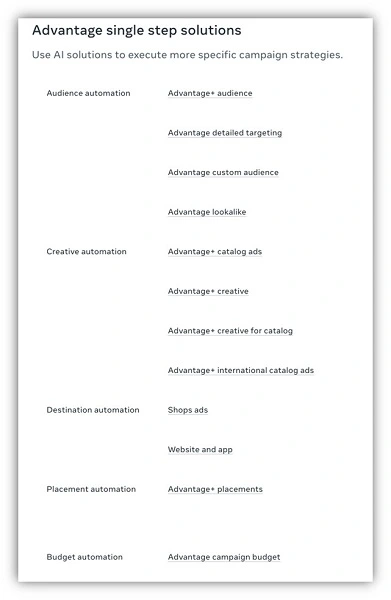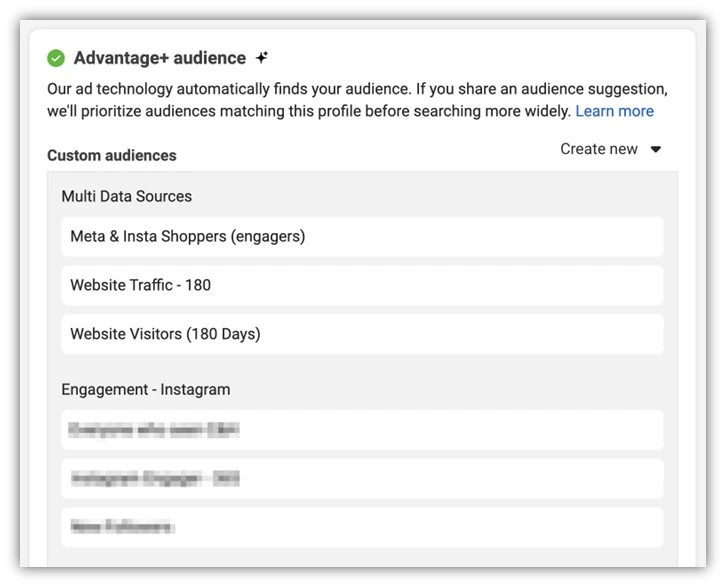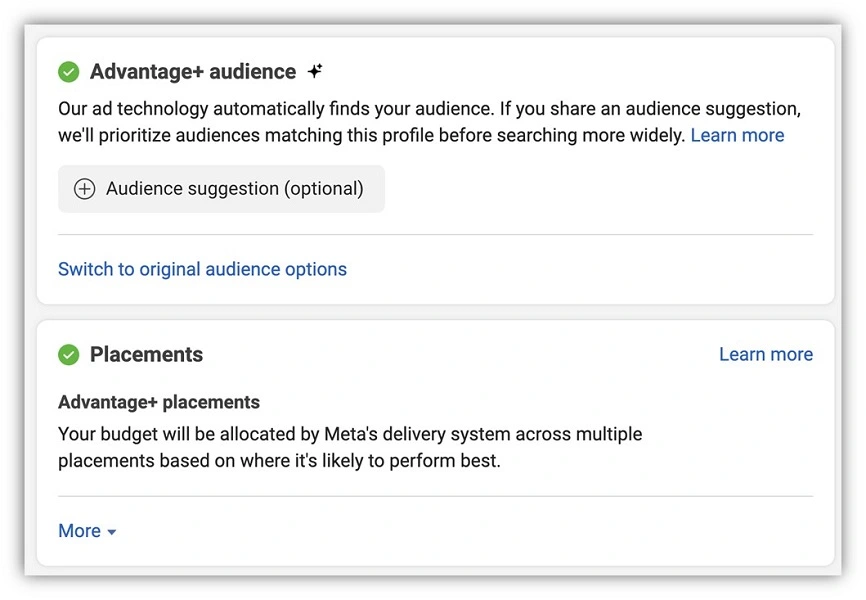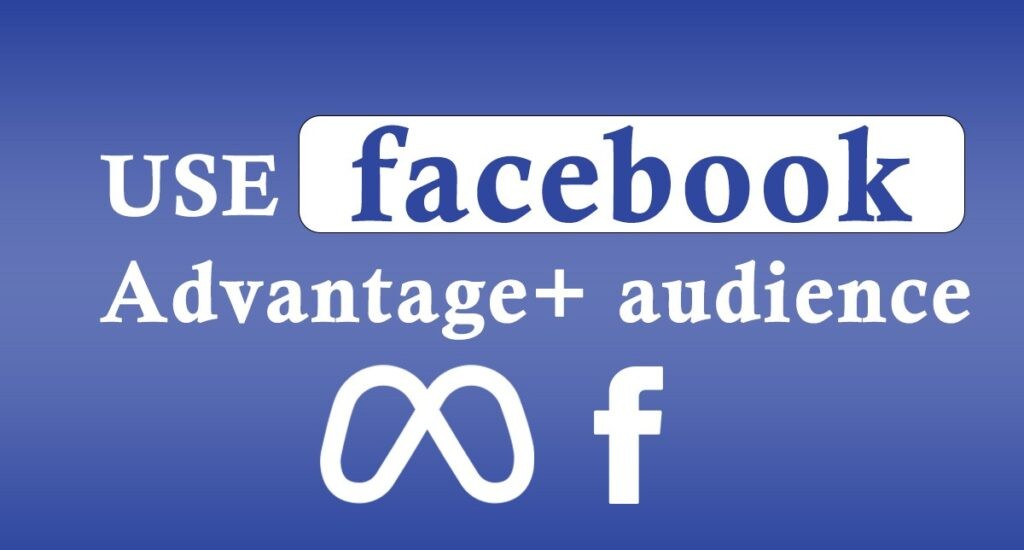Over the past few years, machine learning has overtaken the largest Digital paid advertising platforms including Google, Meta, and LinkedIn. These tools and settings promise to give advertisers the cutting edge in targeting and optimization capabilities. Meta’s recent response in the AI battlefield has been to roll out a variety of campaign and ad set settings under the name Advantage+.
If you have been managing ads within Meta Ads over the past year, it is a guarantee that you have been pushed heavily towards adopting these settings. What is Advantage+? Will you get better results from it? Or is all of this an elaborate way to bloat performance?
In this article, I’ll answer all of these questions and more.
What is Meta Advantage+?


In 2022, Meta announced their “Advantage Suite,” as a response to the impact of Apple’s iOS 14 privacy update.
Originally, Meta Advantage+ was focused on shopping campaigns, using machine learning to help e-commerce advertisers streamline campaign construction and performance optimization. Over time, “Advantage+” settings have been rolled out across all campaign types.
This is similar to Google’s Performance Max (PMAX) campaign type they rolled out in November 2021.
Performance Max (PMAX) allows advertisers to access all of Google Ads inventory from a single campaign and drive more conversions using AI across “bidding, budget optimization, audiences, creatives, amongst others.”
The language used by Meta shows a clear intention of using AI to streamline campaign management in a nearly identical manner to Performance Max, making it seem less of a response to IOS 14 and more of a response to the market.
Here is a list provided by Meta of all places where Advantage+ tools can be applied:


There is a very clear motive here to make advertising with Meta as hands-off as possible. Relying on AI to carry a large portion of the workload around campaign creation and optimization.
For advertisers, this seems like a pretty good selling point for trying out the platform. For more seasoned professionals, the economic incentive of the platform is a little bit murky.
Pros of using Meta Advantage+
Here are some of the benefits of Meta Advantage+.
1. Ease of use
Advantage+ campaigns and settings can be very useful for a number of reasons, but most importantly it simplifies the process of getting started quickly on the platform.
Very much like P-Max within Google, Advantage+ takes a lot of the detailed work out of constructing campaigns and crafting audiences manually to match your target persona.
If you decide to try Advantage+ campaign settings, you will essentially be tasked with providing Meta with audience inputs. So for example, you can construct an ad set that tells Meta “find me similar users to those within these audiences,” as you can see below.


The simplicity here is the selling point, as you will be handing the heavy lifting over to the AI side of Meta’s advertising platform. This can allow a novice user to get started and live with ads within a day or so given that they have something to promote with creative and copy assets ready to go.
2. For e-commerce businesses, Advantage+ has shown promising results
Through my experience, I have found these campaign types to be more successful with ecommerce businesses as I believe the AI is more adept at identifying user buying behavior (or propensity to purchase) over something like their likelihood of submitting a form to schedule a sales call.
This also aligns with my experience using Performance Max with Google where the current state of AI tools within advertising appear to have direct purchases more ironed out than that of a longer more complex marketing funnel.
3. Advantage+ simplifies your account structure
Along with the simplicity aspect, having everything in one centralized ad set eliminates the cumbersome exercise of having a complex account structure.
You could have a few campaigns with different goals and only have to manage one ad set within each. This would allow novice advertisers to have budgets optimized at the campaign level. Everything would be very straightforward and predictable from a Facebook ad cost perspective.
Cons of using Advantage+
Wondering why a business wouldn’t want to try Meta Advantage+? Here are a few drawbacks.
1. You could accidentally opt into Advantage+
As an experienced user of the platform, I have found many issues with Advantage+ that tend to align with the direction of paid media as a whole.
The biggest issue is that with any new products released by major advertising platforms, you go from being politely recommended adoption to being essentially forced to use them.
Over the past year and change, we have gone from having Advantage+ as a “neat” little option to try out, to being forced to work overtime removing it from all new campaigns created to ensure that it is not enabled in any way. This is a huge issue considering I don’t believe the product is as air-tight as they market it to be.
As mentioned above, I have seen it work relatively well for ecommerce businesses, but for everyone else, it has been far from an efficient alternative to what was already there.
Even if you choose to create your campaign the traditional way, Meta tries very hard at every step to force you to adopt Advantage+ settings. For example, here is the flow for creating a new campaign:


Let’s say that you select a manual leads campaign and then go forward with creating that. Meta will automatically encourage you to use Advantage+ by default:


To create a campaign the traditional way you have to revert these settings. Something as simple as removing the Audience network (something I have done for a number of years) takes extra effort.
Additionally, there is an audience expansion setting that is automatically selected every time you create a new Ad Set:


2. Lead quality can be questionable
The checkbox in the above image can be easy to miss, and I have had it cause problems for larger clients of mine. For example, I have a client who runs sales demo ads for B2B, and this setting was enabled on a new ad set.
With a high level of spend, within the next week or so the database was flooded with junk leads, most of which appeared to be bots. When this setting was removed, the quality returned to normal. Meta had no explanation for this, and the client was given an ad credit.
This leads me to the greatest con of Advantage+, the quality. My experience outside of ecommerce clients has been nothing but low-quality results that look good on the surface, but when those leads are looked at more closely there is an overwhelming amount of junk.
3. Lack of visibility and manual control
The other con I have found is the lack of visibility, as an experienced user. For those just getting started, it may be alluring to allow the platform to decide who to show ads to.
However, for someone like myself who has been working professionally in the space for a long time, I know better than to trust these platforms to target with the precision that I know is best for the client.
Many of these Advantage+ audiences likely have an excess of bloat (with questionable bot activity) to potentially pad the statistics being reported.
Coming from a background of direct results and a strict focus on lead quality, these campaign settings are the opposite of what I’m looking for.
It’s a general trend on all platforms to remove this visibility and direct control from the advertiser and replace it with their own “just trust us” attitude while each of the conglomerates’ primary goal is increased revenue.
What Meta Advantage+ means for the future of Meta Ads
If my clients can drive an abundance of sales and all of the qualified leads they can for a reasonable advertising cost, I truly don’t mind if Meta’s Advantage+ AI is figuring everything out in the shadows.
Meta’s Advantage+ is yet another step in the direction of automation and simplification, catering primarily to newer advertisers who might benefit from a more hands-off approach. However, the drawbacks for seasoned professionals are hard to ignore.
The promise of AI-driven optimization is alluring, but as with any tool, it’s crucial to weigh the pros and cons based on your specific needs and expertise.
For those who value precision, control, and quality, the current state of Advantage+ leaves much to be desired. Ultimately, it’s up to each advertiser to decide whether these new tools serve their objectives or if they’re just another step toward relinquishing too much control to the platforms themselves.
One very important point that I would like to make clear is that machine learning takes time. That’s the point of this type of technology—it “learns” over time. Many Advantage+ campaigns may improve over time and, eventually, outperform standard campaign settings.
If you’re looking for more support with navigating AI in Facebook ads and beyond, see how our solutions can help you maximize your campaign success and stay ahead of major platform changes!

